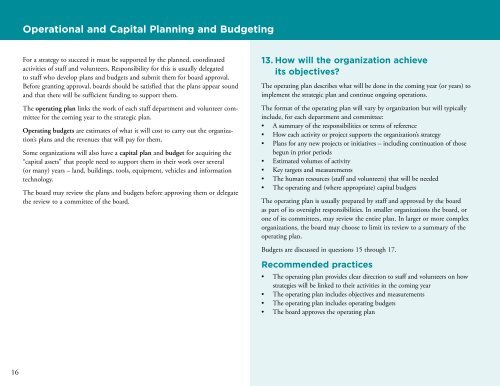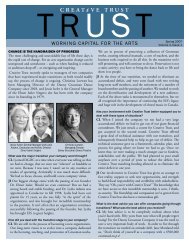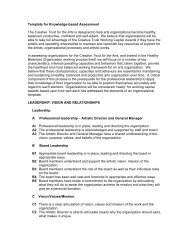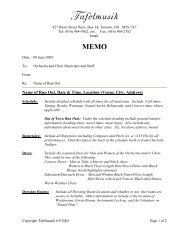20 Questions - Canadian Institute of Chartered Accountants
20 Questions - Canadian Institute of Chartered Accountants
20 Questions - Canadian Institute of Chartered Accountants
Create successful ePaper yourself
Turn your PDF publications into a flip-book with our unique Google optimized e-Paper software.
Operational and Capital Planning and Budgeting<br />
For a strategy to succeed it must be supported by the planned, coordinated<br />
activities <strong>of</strong> staff and volunteers. Responsibility for this is usually delegated<br />
to staff who develop plans and budgets and submit them for board approval.<br />
Before granting approval, boards should be satisfied that the plans appear sound<br />
and that there will be sufficient funding to support them.<br />
The operating plan links the work <strong>of</strong> each staff department and volunteer committee<br />
for the coming year to the strategic plan.<br />
Operating budgets are estimates <strong>of</strong> what it will cost to carry out the organization’s<br />
plans and the revenues that will pay for them.<br />
Some organizations will also have a capital plan and budget for acquiring the<br />
“capital assets” that people need to support them in their work over several<br />
(or many) years – land, buildings, tools, equipment, vehicles and information<br />
technology.<br />
The board may review the plans and budgets before approving them or delegate<br />
the review to a committee <strong>of</strong> the board.<br />
13. How will the organization achieve<br />
its objectives?<br />
The operating plan describes what will be done in the coming year (or years) to<br />
implement the strategic plan and continue ongoing operations.<br />
The format <strong>of</strong> the operating plan will vary by organization but will typically<br />
include, for each department and committee:<br />
• A summary <strong>of</strong> the responsibilities or terms <strong>of</strong> reference<br />
• How each activity or project supports the organization’s strategy<br />
• Plans for any new projects or initiatives – including continuation <strong>of</strong> those<br />
begun in prior periods<br />
• Estimated volumes <strong>of</strong> activity<br />
• Key targets and measurements<br />
• The human resources (staff and volunteers) that will be needed<br />
• The operating and (where appropriate) capital budgets<br />
The operating plan is usually prepared by staff and approved by the board<br />
as part <strong>of</strong> its oversight responsibilities. In smaller organizations the board, or<br />
one <strong>of</strong> its committees, may review the entire plan. In larger or more complex<br />
organizations, the board may choose to limit its review to a summary <strong>of</strong> the<br />
operating plan.<br />
Budgets are discussed in questions 15 through 17.<br />
Recommended practices<br />
• The operating plan provides clear direction to staff and volunteers on how<br />
strategies will be linked to their activities in the coming year<br />
• The operating plan includes objectives and measurements<br />
• The operating plan includes operating budgets<br />
• The board approves the operating plan<br />
16












